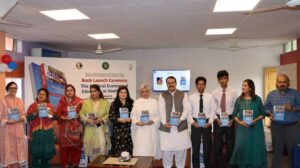Two-day conference on “Early Childhood Care and Education Emergencies” begins
KARACHI:A two-day conference on “Foundation Learning and Early Childhood Care and Education Emergencies” was commenced here in collaboration with the Sindh Government and UNICEF on Tuesday.
The conference witnessed the participation of representatives from provincial health minister, Dr. Azra Fazal Pechuho, provincial education minister, Syed Sardar Ali Shah, Secretary Education, Ghulam Akbar Laghari, Chief of Field Office UNICEF Sindh Prem Bahadur Chand, Dr Junaid Samo Chief Program Manager RSU, Dr. Fauzia Khan Additional Secretary Chief Advisor Curriculum as well as representatives from UNICEF, the World Bank, Save the Children, Idara e Taleem-o-Agahi, AKU, and other national and international organizations.
The Two-Day Conference on ECCE & Foundational Learning Crisis in Emergencies is a gathering of all key stakeholders to address the challenges faced by the education system in Sindh and Pakistan. Whilst COVID-19 is a lingering health crisis, the devasting floods have washed away whole villages across Sindh, Balochistan, KP and some districts of Punjab, leaving more than 2 million children in Pakistan inaccessible to education and damaged nearly 27,000 schools in the country.
These emergencies emphasize the urgency to build more resilience and preparedness for such crises and to ensure growing investment and system strengthening to the continuum of Early Childhood Care and Education (ECCE) and Foundation Learning in lower primary (up to grade 3). Growing investment in these two sub-sectors where a majority of the enrolled children are present will create sustainable lifelong learning possible.
The Foundational Learning crisis in Pakistan has solid evidence.
Addressing the conference, Provincial Health Minister, Dr. Azra Pechuho, stated that numerous schools in the province were severely affected during the 2022 floods, resulting in extensive delays in their reconstruction. Consequently, the education of children attending these schools has been disrupted for a period of 4 to 5 years, which are crucial years for their learning and development. It is imperative for us to embrace e-learning and virtual education as we bring children back into the education system. Bringing out-of-school children back into the learning environment is crucial, she said, adding that during the COVID-19 pandemic, children remained confined to their homes, and Govt made efforts to ensure their immunization, minister added.
Speaking at the conference, Provincial Education Minister, Syed Sardar Ali Shah, emphasized the role of mothers as the first and best early childhood educators. Early childhood education teachers play a vital role in guiding children towards proper education and the right path, just like mothers. The Minister further stated ‘he had studied all laws pertaining to Education in Pakistan and all provinces, and he did not find any definition of a school’. Due to this lack of definition, the schools with just one or six rooms were built, he said and expressed disappointment at the fact that no philanthropist had come forward to help in constructing schools, unlike Mir Ghulam Muhammad Talpur, who built schools in Tando Bagho during the 1920s. “Today, no one is stepping forward to construct schools which were affected during the flood” minister added. Shah further mentioned that they had hired sixty thousand teachers based on merit, which is a record achievement. They faced numerous obstacles in the bureaucracy, but with the clear directives from Chairman Pakistan Peoples Party, Bilawal Bhutto Zardari, and Chief Minister Sindh, Syed Murad Ali Shah, they succeeded in recruiting teachers purely on merit.
He added that process of appointments of the lecturers under the Sindh Public Service Commission have been completed, and once colleges reopen in August, the shortage of lecturers will be resolved. He also announced the appointment of 659 early school teachers and plans to hire an additional 1600 early school teachers. He further added that Music teachers will also be hired within 15 days.
Highlighting the significance of formulating education laws, Secretary School Education, Ghulam Akbar Laghari, mentioned that everyone faced difficulties during the floods, but children were the most affected. School buildings suffered damages, and camps were established for affected students. Temporary learning centers were set up with the cooperation of UNICEF and other international organizations. Efforts were made during the emergencies to ensure that children’s education remained uninterrupted. This conference aims to discuss how to sustain education during such emergencies. We must remain prepared for any future emergencies.
During the conference, panel discussions were held among educational experts, where recommendations were presented on how to continue education during emergencies.
Source: Dailybalochistantimes.com




